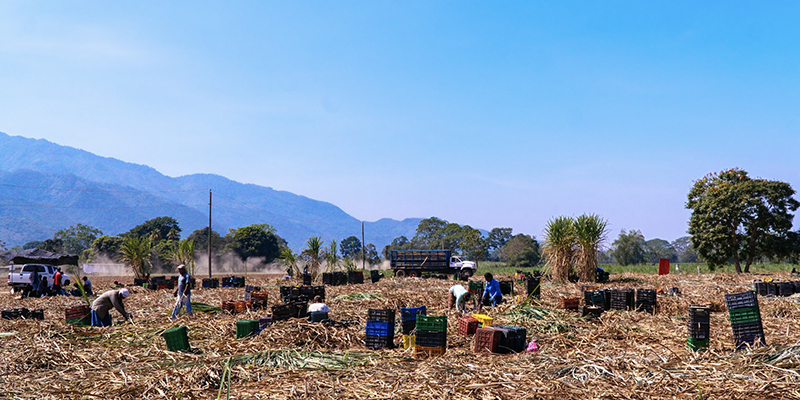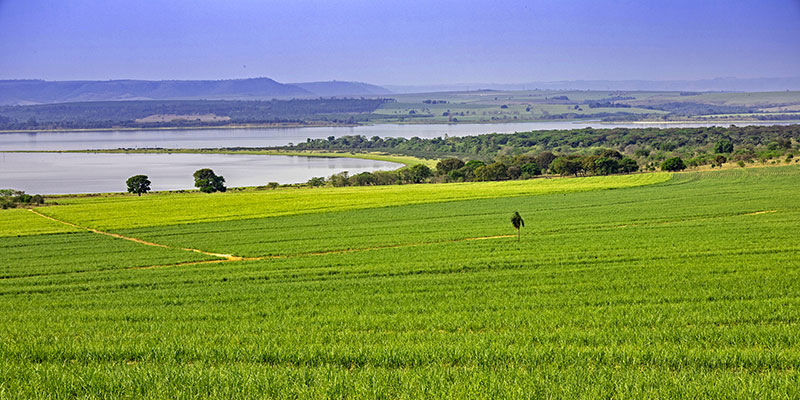21st May 2024

Azunosa sugarcane plantation, Honduras, 2024
Climate change is one of the biggest sustainability risks not only in the sugarcane supply chain, but across all agricultural commodities worldwide. Yet globally, agriculture is directly responsible for up to 8.5% of all greenhouse gas emissions, with a further 14.5% coming from land use change.
To support sugarcane and cotton producers in taking their climate action work further, we will develop a toolkit for climate action together with our partners Better Cotton, Socicana, South African Cane Growers Association, SW Sugars, and Raízen.
With financial support from the ISEAL Innovations Fund and the Bonsucro Impact Fund, we will consolidate our climate action roadmap and develop tools and processes that drive climate action in sugarcane and cotton production, but that can benefit other crops and the whole ISEAL community.
Our climate action work so far
Bonsucro has prioritised the roll out of a climate action roadmap as a key strategic objective in our 2021-2026 Strategic Plan.
Since 2022, we have taken several steps to advance this roadmap, including:
- Revised the Bonsucro Calculator to measure operators’ GHG emissions using the latest science available.
- Launched the ClimateCane Tracker, enabling operators to set science-based targets to reduce their emissions in line with 1.5 degrees. The ClimateCane Tracker was developed using SBTI’s FLAG commodity-pathway guidance.
- Undertaken an assessment of whether Bonsucro can adapt its data systems and claims and labelling rules to offer buyers a credible carbon impact claim as part of our certification. The impact of this work will depend on whether the GHG Protocol and the SBTi rules recognise certification and some adaption of our chain of custody system.
- Made revisions to the Bonsucro Production Standard, with the indicator 3.2.1 requiring operators to conduct a climate risk assessment and ensure that a Climate Change Mitigation and Resilience Plan is in place and implemented.
- Awarded grants to seven climate action and water stewardship projects through the Bonsucro Impact Fund (BIF).
These activities have been extremely well received by our members and we are confident that the holistic toolkit envisioned in this project can further facilitate action among companies.
Why this project?
We have drawn three main learnings from our climate action work over the last few years:
- Climate action in agricultural supply chains is complex.
The science is continually evolving, uncovering new barriers and hurdles. This complexity will only be overcome by a joint effort and commitment from all involved. Due to their global positioning and insights, as well as their influence in different supply chains, Voluntary Sustainability Standards (VSS) have a key role to play.
- Other commodity based VSS have been on a similar journey around climate action.
Aligning lessons learnt and experiences will be critical in developing aligned strategies to address the issue effectively.
- A holistic response is needed.
Our response needs to address both climate adaptation and climate mitigation. It also needs to consider best practice in terms of accounting and tracing impacts and outcomes of interventions.

Sugarcane plantation, Brazil, 2022
What will we do?
The project will support the implementation of climate action among a range of stakeholders. It will assist them to understand the impacts of a changing climate on their operations, and how to measure and reduce their carbon footprint as part of their efforts.
We will facilitate a learning platform for our project partners to share their experience. The process and tools will be adapted for use in their climate action work.
The project will be implemented through four buckets of activities:
- Consolidation, exploration and technical review: assessing what has been done by Bonsucro and others and understanding the science related to developing the tools and processes. This will ensure that where solutions exist, they are analysed and tested against the requirements in the sugarcane sector, and that the best science is deployed to simplify our work.
- Tool/process development: the tool/process will be aligned to best science through an iterative teaching and learning set of activities.
- Pilot testing and review: the tool/process will be pilot tested among project partners and other collaborators. This field test will gather valuable data on the ease of deployment and accuracy of information and other input from partners. These responses will inform refinements made to the tool/process.
- Convening, communicating and development of resource material: this key element will be integrated in all activities.
Expected outcomes
Ultimately, we aim to deliver a toolkit comprising:
- A climate vulnerability assessment tool and guide; bringing further emphasis on climate adaptation for a more holistic approach.
- A climate mitigation target-setting tool and guide for sugarcane transportation and processing phases. Our intention is to embed this into the Bonsucro ClimateCane Tracker, making it a more holistic tool to help the sector define its emission reduction targets from farm up until the mill gate;
- A carbon removals accounting system embedded within the Bonsucro Calculator;
- A GHG data transfer guide across the sugarcane value chain; this will help Bonsucro and other VSS towards incorporate best practices on how GHG data can be credibly and safely transferred along supply chains. This will feed into the next revision of Bonsucro’s Chain of Custody Standard.
These deliverables will be supported through a comprehensive convening, learning and information exchange process embedded in all project activities.
By creating a fully integrated climate mitigation and adaptation toolkit, we would like to enable Bonsucro members to:
- understand their climate vulnerabilities and adaptation gaps
- track their GHG emissions and removals
- set targets for their sugarcane farming, transportation and milling operations and further implement reduction practices.
The success of the project will also be defined by its wider impact among other VSS by providing a framework, work plan and set of activities in creating a climate action roadmap for their sector or commodity.
The project was possible thanks to the Bonsucro Impact Fund and a grant from the ISEAL Innovations Fund, which is supported by the Swiss State Secretariat for Economic Affairs (SECO). It will be implemented over the next two years (April 2024 to March 2026).
We look forward to sharing further developments; follow us on LinkedIn to make sure you get the latest updates about this project and our work to drive sustainability in sugarcane.





